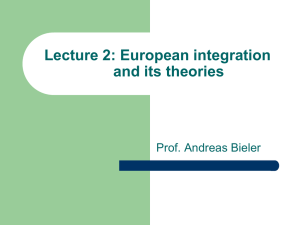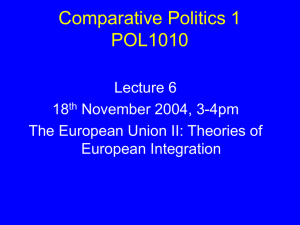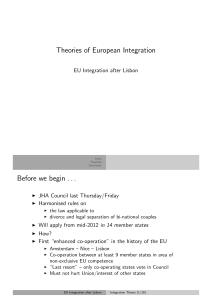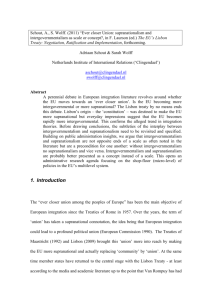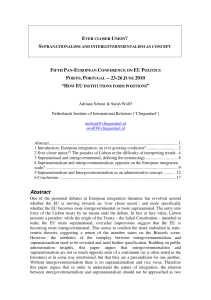How useful are theories of integration to understanding the
advertisement
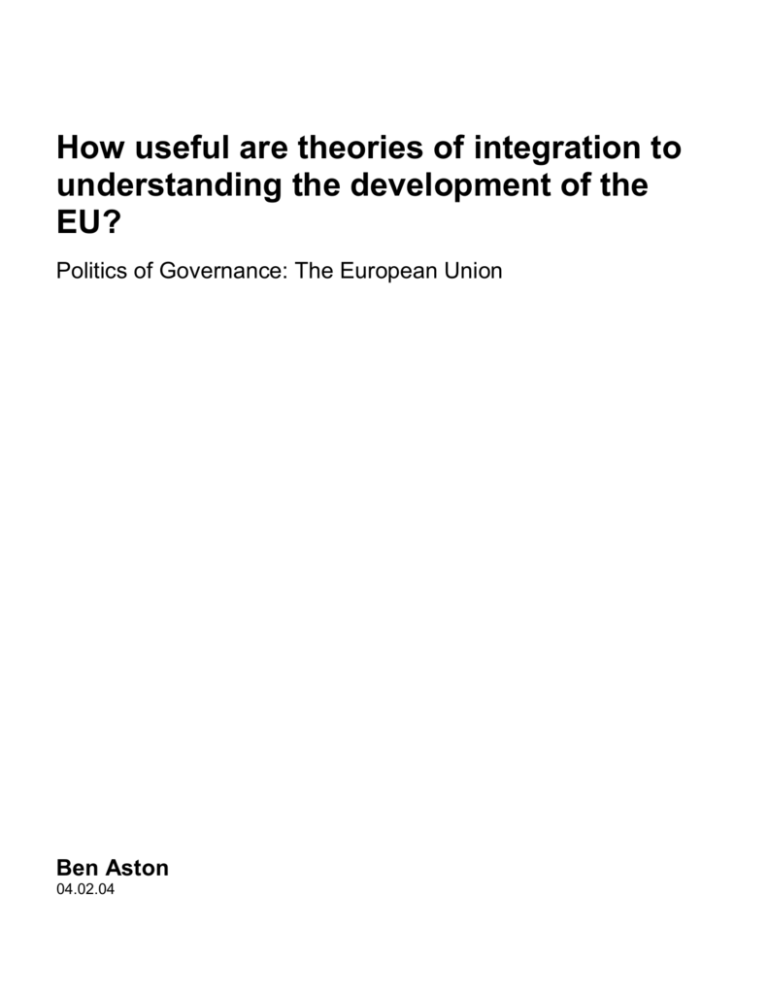
How useful are theories of integration to understanding the development of the EU? Politics of Governance: The European Union Ben Aston 04.02.04 How useful are theories of integration to understanding the development of the EU? “There is no historical precedent for the creation of a multinational, multicultural, and multilingual federation of states with mature social, economic, political and legal systems. In this regard the EU is a colossal and original enterprise.”1 From the beginnings of its development, there have many causes for the development of what is now the European Union (EU). This essay examines theories of integration and evaluates their validity in explaining the development of the EU. Then, by scrutinising these theories, this essay will seek to establish which, if any provide a comprehensive explanation for the development of the EU. Theories of integration offer explanations of how and why supranational governance has developed. Whilst there are undoubtedly many different causes and factors which have contributed to the development of the EU, this essay primarily focuses on neo-functionalism and intergovernmentalism as well as some new theories of integration which seek to explain the development. Although federalist and functionalist theories provide an interesting normative account of integration, their use in explaining the development of the EU is limited as they have been superseded by newer, more comprehensive theory. The ‘development of the EU’ is in itself a contentious term; for what constitutes development? For the purposes of this essay, development will be understood to mean the rise of supranational institutions combined with the deepening and intensification of inter-state relations within the EU. Neo functionalism was developed in the mid 1950’s by American scholars who first tried to theorise the new forms of regional co-operation in the wake of the Second World War. The theory was initially developed as a ‘grand’ theory of international relations in an effort to explain regional integration processes. However, European political and economic integration was more suited to the study and so the approach became increasingly Eurocentric and less relevant to other areas of regional integration. Neo-functionalism mainly concerns itself with the process rather than the end result of integration. “Perhaps the most important (and most discussed concept in the neofunctionalist armoury was the idea of ‘spillover’ which was used to depict the mechanisms supposedly driving processes of regional integration.”2 Haas’ concept of spillover is essentially the 1 2 M. Cini, European Union Politics, Oxford University Press, 2003, p.73 B. Rosamund, Theories of European Integration, Palgrave, 2000, p.59 2 way in which increased cooperation between states necessitates integration in one policy area which subsequently has a knock on effect, creating pressures for further integration in neighbouring policy areas. “Spillover refers to a situation where co-operation in one field necessitates cooperation in another;”3 effectively it is a domino effect of integration. Distinctions can be drawn between different types of spillover. Functional spillover is co-operation in one policy area necessitating co-operation in other related areas in order for the initial policy area function to function effectively. Political spillover is found where policies become inextricably linked to each other, not through necessity but rather as part of a bargaining process whereby states agree mutual support for each other in negotiations in so called ‘package deals’. Cultivated spillover could be considered unintentional integration, where integration is not the primary motive but rather the effect of delegating authority to supranational institutions. Lindberg and Scheingold suggest “by and large most [national governments] are concerned with achieving concrete economic and welfare goals and will view integration only as a means to these ends.”4 The establishment of the EU is thus seen rather as an unintended consequence of power delegation. Elite socialization is an aspect of neo-functionalism which suggests that people involved on a regular basis in supranational policy making will tend to develop European loyalties and preferences.5 The bureaucratic elite in turn try to convince their national elites of the advantages of supranational co-operation and their loyalties shift away from their national institutions towards European institutions. Similarly, neo-functionalists predicted an increase in the formation of supranational interest groups growing in response to the formation of supranational institutions to influence policy decisions. Whilst neo-functionalism provided an adequate explanation for the development of the ECSC and the development of the European Community up to the 1960’s, critics argue it is empirically weak as it failed to explain the demise in integration from this period. The lack of continual integration during the 1970’s suggests the neo-functionalist prediction of a gradual intensification of political 3 M. Cini, European Union Politics, Oxford University Press, 2003, p.81 L .Lindberg & S. Scheingold, Europe’s Would-Be Polity – Patterns of Change in the European Community, PrenticeHall, 1970, p.117 5 C. Pentland, International Theory and European Integration, Free Press, 1973 4 3 integration was incorrect. “Neo-functionalism appeared to mis-predict both the trajectory and the process of EC evolution.”6 Theoretical critiques of the theory raise three objections to the theory. Firstly, that elite socialization is relatively unimportant. Taylor notes that states were themselves ‘aware of the need to ensure that they had reached their quota of European civil servants.’7 Secondly, that the regional integration of the EU should be considered with an appreciation and awareness of growing integration in the international realm; not just in Europe. Thirdly, critics suggested that greater importance should be attributed to the nation state and regional co-operation should be analysed as intergovernmental institutions. However, the development of the European Community saw a renewed popularity in neofunctionalist theory. The Single European Act and goal of the single market marked a revival in economic and political co-operation in Western Europe which seemed to once again follow the spillover effect predicted by neo-functionalists. However, the new approach to neo-functionalism takes a new, “‘transaction-based’, theory approach which draws attention to the increasing levels of transactions (such as commerce, travel, communications) across EU borders which in turn increases demands for European-level regulation.”8 An example cited by many of the theorists is the case of the European Court which now has supremacy over national legal systems and plays an important role in the building of a supranational community. Intergovernmentalism emerged during the 1960’s as a critique of neo-functionalism and federalist predictions that the European Community was en route to becoming a state in its own right. Intergovernmentalism argues that “European integration is driven by the interests and actions of nation states.”9 The theory is influenced by classical international relations theory with neo-realist perspectives on the role of the state and interstate bargaining. Neo-realists accept that within the anarchic international system there is potential for order and international co-operation as a means of state survival and that the EU is an institution which can reduce anarchy. Intergovernmentalists suggest that whilst sovereignty resides with individual member states within the EU, it may be in the 6 A. Moravcik, Prefernces and Power in the European Community: A Liberal Intergovernmentalist Approach, Journal of Common Market Studies, vol. 34, no. 4, 1993 p.476 7 P. Taylor, Regionalism and Functionalism reconsidered, Frameworks for International Co-operation, Pinter, p.180 8 A. Stone Sweet & W. Sandholtz, ‘Integration, Supranational Governance, and the Institutionalization of the European Polity’ European Integration and Supranational Governance, Oxford University Press, 1998, p.11 9 S. Hix, The Political System of the European Union, Macmillan, 1999, p.15 4 states’ interests to pool their sovereignty and delegate certain powers to European institutions. This is a result of the belief that “governments seek integration as a way of solving problems that they have in common.”10 Rather than a transfer of sovereignty, intergovernmentalists regard European co-operation more as a delegation of power to facilitate the working of European intuitions enabling them work to more effectively and give them greater credibility. Drawing from intergovernmentalism, liberal intergovernmentalism, bases itself on the idea of two level games. Firstly, policy preferences within the domestic environment of the state and secondly, interstate bargaining in the international realm. “National executives play games in two arenas more or less simultaneously. At the domestic level, power seeking/enhancing office holders aim to build coalitions of support among domestic groups. At the international level, the same actors seek to bargain in ways that enhance their positions domestically by meeting the demands of key domestic constituents.”11 Moravcsik’s theory of liberal intergovernmentalism perceives the EU as an intergovernmental regime designed to manage economic interdependence through negotiated policy co-ordination. The theory suggests that all decisions made by the EU are effectively the result of bargaining between states. Liberal intergovernmentalism understands co-operation between states as a result of the demand for integration from the nation state being met by the supply of integration from interstate bargaining. Policy preferences at a national level are constrained by the interests of dominant, usually economic, groups within society and national governments represent their interests in international forums. Moravcsik believes therefore that national interests derive from the domestic politics of member states. The supply of integration focuses around governments bargaining with each other in an attempt to gain the upper hand. Institutional delegation is the element within liberal intergovernmentalism which suggests that supranational institutions are established to facilitate efficient interstate bargaining; “To secure the substantive bargains they had made…governments delegated and pooled sovereignty in international institutions for the express purpose of committing 10 11 B. Rosamund, Theories of European Integration, Palgrave, 2000, p.140 B. Rosamund, Theories of European Integration, Palgrave, 2000, p.136 5 one another to cooperate”.12 This shows their commitment to the bargaining process and discourages non-compliance. The liberal intergovernmentalist approach has been criticised for having too narrow a focus, ignoring day to day politics and concentrating only on high profile policy changing cases that inevitably prove the theory correct. Critics point out that in cases where majority voting rather than international negotiations apply, liberal intergovernmentalism may not give such clear results. Critics would also suggest that Moravcsik’s conception of the state is too narrow and simplistic as it focuses too much on economic concerns and fails to appreciate that the EU is much more of a multi level polity than the two level polity of Moravcsik’s theory. Moravcsik’s downplaying of the importance of supranational institutions within European integration has also been criticised; “Moravcsik’s portrayal of the Commission as exercising a role of little more than a facilitator in respect of significant decision making has attracted particular criticism, with numerous empirically based studies claiming to show the Commission does exercise an independent and influential decision making role.”13 Critics suggest that the through policy entrepreneurship, the Commission can have an influence policy outcomes. As well as the traditional neo-functionalist and intergovernmentalist approaches to the development of the EU, there has been a shift to new styles of theoretical work which, rather than attempting to develop grand theories have been more interested in developing middle range theories in an attempt to explain aspects of the ‘phenomenon’ of the EU. These theorists would suggest that previous theory has been asking the wrong questions. “What merits attention and attention is the process through which the EU delivers authoritative outputs and not the ‘big picture’ question of what the EU is becoming.”14 Current theorists are more interested in explaining policy process and the workings within the system which they regard as more useful. Whereas neo-functionalist and intergovernmentalist theorists considered integration to be the dependent variable, the status of Euro-polity has now changed. Rather than attempting to explain integration, EU integration has now become the independent variable, accepted now as a factor that can explain other phenomenon. 12 A. Moravcik, The Choice for Europe, Social Purpose and State Power from Messina to Maastricht, UCL Press, 1998, p.3-4 13 N. Nugent, The Government and Politics of the European Union, Macmillan, 1999, p.510-11 14 M. Cini, European Union Politics, Oxford University Press, 2003, p.112 6 New theories of integration are much less helpful in explaining the development of the EU as their focus tends to be much broader and has departed from thinking of the EU strictly in terms of integration. Using international relations theory, new theories look at the role of the EU from a ‘policy supplier’ perspective. These theories seek to answer questions more of policy; why and how policy change is implemented and the effects for Europe and the wider world rather than the development and trajectory of the EU. Theories of integration can be useful to help establish an understanding of the various aspects European Union development. However, no theory in itself provides a completely adequate and comprehensive explanation for the multidimensional and uneven development of the EU. Different integration theories provide explanations for different stages and patterns of the development. Intergovernmentalism can explain the process of interstate bargaining and how domestic goals can accelerate European integration but, the theory is not fully comprehensive and concentrates only on politics between member states executives. The development of the EU is clearly much broader than that. Conversely, new neo-functionalists such as Stone Sweet and Sandholtz accept the broader integration outside interstate bargaining, realising that all transactions within the EU in communications, travel and trade are important to the development of the EU itself. The increased transactions increase interdependency and thus the development of the EU. Whilst many would question the relevance of traditional neo-functionalist theory to integration today, there is no doubt that a transaction based account of integration can explain much of the process of development. Transaction based perspectives provide possibly the most comprehensive explanation to understanding the development of the EU. There are parts of the development that cannot be explained by these theories. But being an entirely novel institution and with no pre-cursor, theorising and predicting the future of an institution as complex as the EU will inevitably be fraught with error. 7
